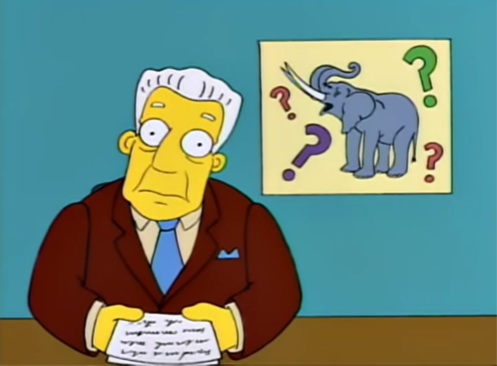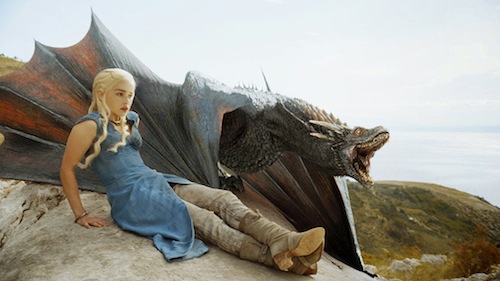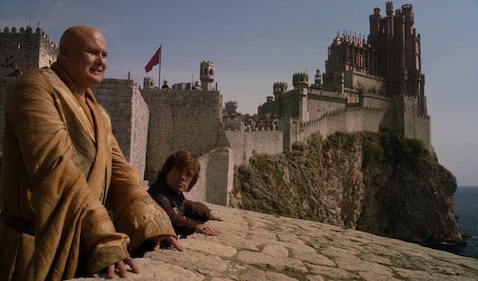If there is one thing Machiavelli’s The Prince needed, it was more dragons. Alas, it would have been so easy! All he had to do was mention Saint George.
Although the closest Machiavelli came to discussing these mythic beasts was a brief shout-out for Chiron the centaur, such omissions make HBO’s Game of Thrones and George R. R. Martin’s A Song of Ice and Fire all the more interesting in today’s classroom. After all, if Daenerys Targaryen were a Poli Sci major today, she’d have every reason to throw down her textbooks and demand: “Where are my dragons!”
Where are her dragons? That’s a good question. I say they belong in her classes alongside Hannibal’s elephants.

It may sound ridiculous to reference works of fantasy in order to better explain politics, but such a practice is as old as Plato’s dialogues on Atlantis. After all, what is a well-written fictional character other than a device for better understanding ourselves? One philosopher famously examined the moral conscience of Huckleberry Finn, and medical doctors have repeatedly diagnosed the illnesses afflicting Charles Dickens’s Tiny Tim. Even Machiavelli did not shy from discussing the Biblical Moses, the hero Achilles, or the mythical Theseus alongside Marcus Aurelius, Julius Caesar, and Pope Leo X in The Prince.
If we entertain this same method, Tywin Lannister’s recent conversation with his grandson over “What makes a good king?” in Game of Thrones becomes little different than if Machiavelli had posed to the young monarch the question “What makes a good prince?” Not only do the rules of political science apply to the world of Westeros in very much the same way as they do in our own, but George R. R. Martin’s characters provide excellent case studies for making otherwise abstract aspects of political theory far easier (and more entertaining) to grasp.
Case in point: the very question of what makes a good king, especially when posed by a character like Tywin Lannister. Was Lord Tywin right? Do the qualities of holiness, justice, and strength ultimately pale in comparison to wisdom? History has plenty of examples to strengthen as well as weaken this claim, including some figures that likely influenced the fictional kings Tywin names. However, the case could also be made that Lord Tywin is a poor person to answer this question not only because of the one-sidedness of the dialogue, but because of everything we as an audience have already learned about House Lannister thus far in HBO’s Game of Thrones.
Without delving into spoilers, Tywin tells the impressionable Tommen that “the wisest kings” listen to their counselors long into their reign. Cleverly, the unspoken lesson in this discussion is that Tommen should always listen to Tywin. It is a shame Machiavelli was not in the room to offer his opinions as well, for he provides an interesting counterpoint to Tywin’s argument when discussing secretaries in The Prince. After citing examples not nearly as well known among today’s audiences as even minor George R. R. Martin characters are, Machiavelli cautions that ministers who think more about themselves than their sovereign “will never be a good minister.” Will Tywin ultimately prove a poor minister—or better yet, has he always been one? His legacy remains to be seen, but he has already demonstrated repeated failings as a father, and it could be argued that those failings have significantly damaged his qualities as an advisor. His particularly toxic relationship with his youngest son, Tyrion, will undoubtedly come back to bite the Seven Kingdoms they both serve—perhaps even in the form of dragons.
See! Just like that, we got to discuss Machiavelli and dragons in the same paragraph.

Such personal failings appear to be instrumental to the characters in Game of Thrones, never mind the complexities of their political nature. Just about every character seeking the Iron Throne has somehow found their claim hindered by (frequently) self-inflicted wounds. House Lannister holds the throne, but their claim is illegitimately founded on incest. House Baratheon owns it by blood and the written words of Eddard Stark, but Stannis Baratheon’s religious fanaticism and his younger brother Renly’s private affairs severely undercut both their best efforts. Daenerys Targaryen claims the Iron Throne in exile, but her armies are an ocean away and her prized dragons have become increasingly unpredictable. House Tyrell plays the game of thrones better than anyone else in the Seven Kingdoms, yet they have never won the grand prize. House Stark plays the game fairly, and for that reason, Starks die. If Machiavelli had HBO, he would have had more than enough material to write books on these families and their many foibles.
Ultimately, enormous credit should be given to George R. R. Martin and HBO not simply for the rich world they’ve created, but for choosing to base their world’s politics very much on our own. Fortunately, these foundations extend far beyond the Wars of the Roses. When Tyrion quips “one game at a time” to Varys’s reports about dragons, he is echoing Abraham Lincoln’s reply to Secretary of State Stanton during the Trent crisis. Whenever the word “Dothraki” is spoken on the show, replace the word with “Mongol” for a better understanding of how huge a threat the Golden Horde was to Europe. Whenever Stannis Baratheon mentions the “Lord of Light,” just picture what would happen if a major U.S. presidential candidate pledged his full faith to Lucifer. And naturally, all this goes without bringing up the white walkers, who function a bit like a climate-change debate nobody in Westeros wants to discuss.
Such is politics as usual in George R. R. Martin’s Westeros, which ultimately makes Game of Thrones as much a political drama as House of Cards or The West Wing. The key difference is that Game of Thrones takes a more timeless approach to political theory, rather than firmly rooting itself in the contemporary United States. As a result, Game of Thrones just might enjoy even more applications in Poli Sci classrooms than Mr. Smith Goes to Washington should professors dare to explore the subject with their students. And should they do so, their students might actually look forward to Monday classes.
Such is the power of Machiavelli once you throw in a few dragons.
Jacopo della Quercia is an educator and history writer with several years experience teaching Machiavelli at the college level. His debut novel, The Great Abraham Lincoln Pocket Watch Conspiracy, is being published by St. Martin’s Press and is available for pre-order; you can read an exclusive, online-only chapter for the book here.











Bravo!!!
Great job JDQ. But also, I think the “What makes a great king?” converstaion is not just about helping Tommen, but also set up for things to come that deal with Cerei-as-Queen-Regent, at least if the books are any guide. Which as we get further along in the show doesn’t seem as likely as it once had.
Anyway, great article.
I’m puzzled by your comparison of the Lord of Light to Lucifer , when it seems obvious to me that this part of the story parallels the rise of Christianity in previously polytheistic Rome. Multiple gods replaced by one, insistance on sacrificial element (martyrdom), dichotomic view of the World, importance of a main prophecy, hegemonistic aspirations and so on make it quite clear, I think.
I think all he meant by that was that the emotional and visceral reaction others in Westeros would have to knowing Stannis had turned to that religion is similar to the reaction that the American public (which is nominally Christian, even if people practice at various evels of devoutness) would have if a politician was an open Satan worshipper.
(Edited for clarity – I’m on a work laptop which keeps jumping my cursor around and I find myself suddenly typing stuff in the middle of a sentence and don’t always edit it back correctly)
Comment #4 unpublished by moderator. If you disagree with the article, please do so in a civil and respectful manner, in accordance with our Moderation Policy. Thank you.
I am the unpublished #4. I simply trying to point out that the discussion of what makes a good king is stikingly similar to book VIII of Plato’s Republic. I even showed how one could interpret characters as representative of Socrates’ discussion of forms of government. Briefly:
Aristocracy – Philosopher King – Rule of the Good/Just/Wise – Likely Tyrion
Timocracy – Rule of the Honorable (Stark/Barathian show the detrimental effects of this system)
Oligarchy – Once the warriors are gone and trade develops, rule by wealth – Tywin
Democracy – Looking at inequality this is rule by equality (or absence of rule) – This is where Denaryus is headed also could be John Snow
Tyranny – Once someone realizes that equality creates a vacuum of power (absence of rule) – a tyrant takes over (Little Finger possibly, perhaps a change of heart for Denaryus).
This process is cyclical. The tyrant wants to start a new aristocracy. Exactly what Dionysius I of Syracuse had Plato attempt.
I added that blood and sacrifice were emblematic of early Christian writings (e.g. Tertullian) and agree with comment #3.
My point, which I am trying to make in a civil and respectful manner, is that I would disagree with using television as a tool for teaching politics. Game of Thrones is little more than a soap opera (I enjoy watching it – this is neither a slight against the author nor Tor.com). However, I do not think it is a useful pedagogic tool for imparting political theory to the public. I enjoy speculative fiction and political theory immensly, and I do think there are some speculative works that can be used as tools in the classroom.
I realise that Tor.com is seperate from the publishing arm of Tor. However, the recent spats regarding politics and the Hugo awards make me sensitive to mixing the two genres or oversimplifying political issues through metaphor.
The rise of the Medici in Italy, a central focus of Machiavelli, is an extremely provocative story. It is a story that many would describe as proto-Marxist, and speaks to the very debates on inequality and market capitalism that seem to be at the forefront of the Hugos and SFWA (I will admit that Machiavelli did not get into identity politics).
Yes, it is interesting to be reminded of the similarity of the Mongel hordes to the horse warriors, and one should question whether or not Denaryus would be a similar ruler without bringing in her dragons. However, I respectfully disagree that Game of Thrones gives us a timeless approach to political theory, or that students in college should be baited to a political science class by letting them watch Game of Thrones (Higher education costs a lot of money).
The politcal situation in the United States, and more specifically within the world of specualtive fiction is extremely partisan. Game of Thrones exists in a world where the rule of law–if it there is a rule of law–allows for one to kill another over political partisanship. I feel that this is the way that the speculative fiction community is dealing with their political fracturing, and we would be better served in coming to terms with these issues by reading political science, reading theory, and engaging in political debates (even though they can be quite uncomfortable and divsive) than believeing we are receiving political education through a television show.
I really need to read The Prince. I’ve been meaning to for years but never have.
@7: Thank you for taking the time to revise your earlier comment–I appreciate it.
@wingracer you totally should. It only takes an hour or two to read the entire book. Absorbing it takes potentially much, much longer of course.
I disagree with your comparison of Stannis/Lord of Light to a President committed to Lucifer. In fact, the Lord of Light is a Big Time Religion in the Far East. A more apt analogy would be if a President were to commit to Allah (rather than Jehova), or perhaps convert to Taoism (which also has a light/dark duality).
@3 The ‘multiple gods’ of Westeros are a clear analog to the Trinity. The Red God embodies a more Manicheistic world view.
GRRM knows his history, but doesn’t make for easy analogies.
@12 – if GRRM is intending his multiple gods of Westeros to be the Trinity, then he may know his history, but he doesn’t know his theology ;)
Although in terms of structure/organization, the church of the Seven is probably the most similar to Christian churches of all of them (priests, a Pope like figure, nuns, etc).
I read The Prince for a class in my MPA program. What I found most interesting is how much I agreed with it and how little the actual book (pamphlet) and the popular image of the book shared.
I strongly recommend reading it, especially if you disagree (or think you disagree) with it. Of course, that’s a standard recomendation of mine: don’t read the books you agree with — read the books you disagree with.
I’d always seen worship of the Lord of Light as being analogous to Islam, with the Faith of the Seven being analogous to Christianity. However, I also like “R’Hllor faith is Christianity, Faith of the Seven is Roman paganism” analogy too, and there’s no reason something can serve double duty